MercoPress. South Atlantic News Agency
Tag: RRS James Clark Ross
-
Friday, December 3rd 2021 - 07:51 UTC
Falklands prepares to welcome state of the art RRS Sir David Attenborough on 9 December
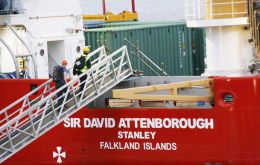
The Falkland Islands Government has invited the public to welcome the RRS Sir David Attenborough as it makes its maiden voyage into the Falkland Islands on Thursday 9 December 2021.
-
Monday, August 23rd 2021 - 12:13 UTC
RRS James Clark Ross has been sold to the Ukrainian Antarctic Scientific Center
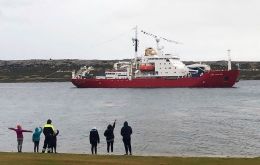
This is the second time that a UK research asset has transferred to Ukrainian research colleagues – the first being the transfer in 1996 of the former Faraday station that is now known as Vernadsky.
-
Friday, March 12th 2021 - 04:49 UTC
RRS James Clark Ross skipper gratitude message to people of the Falklands

Graham Chapman, Captain of RRS James Clark Ross sent a message of gratitude to the people of the Falklands when the polar research vessel left the Islands for the last time.
-
Tuesday, March 2nd 2021 - 09:57 UTC
After thirty years of prolific research, RRS James Clark Ross makes final call to the Falklands
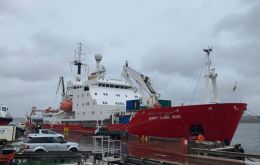
The RRS James Clark Ross (JCR) made her final call to her homeport of the Falkland Islands on Monday March first, since after thirty years of service, the JCR will be sold at the end of her 20/21 Antarctic season.
-
Thursday, December 3rd 2020 - 09:00 UTC
RRS James Clark Ross in South Georgia after seven weeks sailing
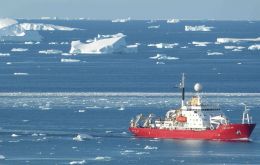
The RRS James Clark Ross has arrived at King Edward Point, South Georgia and the South Sandwich Islands, after seven weeks sailing south from the UK. For the staff disembarking at King Edward Point, this represents the culmination of a journey that started in quarantine in the UK in October to enable safe travel.
-
Tuesday, April 28th 2020 - 08:17 UTC
Antarctica's Rothera new wharf becomes operational and is waiting for RRS Sir David Attenborough
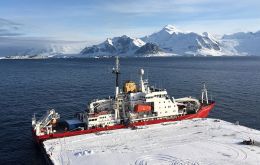
A new £40 million wharf to moor the RRS Sir David Attenborough has been used by polar ships for the first time at British Antarctic Survey’s Rothera Research Station in Antarctica to transport staff and materials back to the UK.
-
Wednesday, April 8th 2020 - 18:30 UTC
BAS ends Antarctic season and organizing the return: chartered ship will leave Falklands for UK 3 May
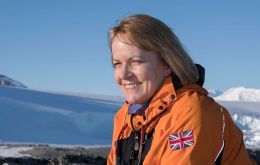
British Antarctic Survey (BAS) has announced exceptional plans to repatriate scientists, support teams and construction workers as they complete their Antarctic summer field season work.
-
Monday, March 11th 2019 - 18:30 UTC
Falklands: First surveys of the Burdwood Bank completed for Marine Managed Areas Project
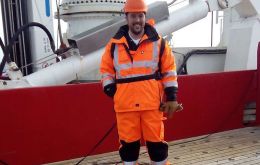
By Ander M. de Lecea - Research scientist Drs Ander de Lecea and Marina Costa of SAERI recently completed their first surveys of the Burdwood Bank, kicking off the “Fine Scaling of the Marine Management Areas of the Falkland Islands” (MMA) project.
-
Wednesday, July 11th 2018 - 06:55 UTC
Britain's new polar research ship scheduled to hit the water next Saturday
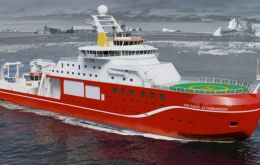
The assembled hull of Britain's new polar research vessel, RRS Sir David Attenborough is now standing on the slipway of the Cammell Laird yard in Birkenhead, awaiting launch day. Weather and tide permitting, she should slide into the River Mersey on Saturday, July 14th.
-
Friday, March 9th 2018 - 04:38 UTC
Plan B for RRS James Clark Ross mission to Antarctica Larsen C Ice Shelf
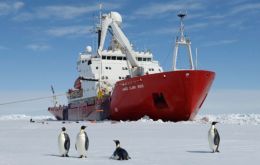
Heavy sea ice conditions have thwarted a science mission from reaching the Larsen C Ice Shelf in Antarctica from which a large iceberg broke off in July 2017. A team of scientists, led by British Antarctic Survey (BAS), are travelling on board the RRS James Clark Ross. Sea ice, up to 4-5 meters thick, has made progress for the ship very slow and on 28 February) the ship’s captain made the difficult decision not to continue.
